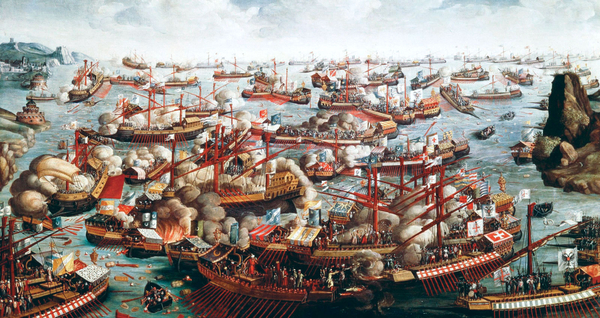Traffic statistics at DanielPipes.org indicate that the following ten articles are my most read writings published in 2021, in ascending order. (Gary Gambill of the Middle East Forum kindly provided the tabulations and summaries.)
10. "Godless Saracens Threatening Destruction": Christian Responses to Islam and Muslims
This two-part manuscript, published in the Winter 2021 and Spring 2021 issues of Middle East Quarterly, examines the evolution of Christendom's relationship to the Muslim world from the birth of Islam to the present.
Part I discusses the "uniquely hostile nature of European views toward Muslims" during the pre-modern era, when Muslims were "medieval Europe's only persistent rival" and enjoyed military superiority or parity.
Part II examines the period from roughly 1700 onward when Europeans enjoyed such primacy that they conquered nearly all Muslim-majority areas of the globe. Combined with a reduction in Christian religiosity, this permitted "more varied and nuanced views" of Islam and Muslims to prevail. However, the emergence of Islamism as a global threat and the upsurge of Muslim immigration in recent years are leading some in the West to again see Islam as a civilizational threat.
 The Battle of Lepanto, October 7, 1571, in which several Christian powers defeated the Ottoman Empire. |
9. Welcome, Conservatives, to Pariah Status
Over the last few decades, establishment institutions in the United States have gone from disliking but tolerating conservatives to "increasingly reject[ing] the very legitimacy of conservatism." Even liberals who break with prevailing progressive consensus can find themselves out, such as former Harvard president Larry Summers and James Bennet and Bari Weiss at the New York Times.
"This trend extends far beyond the life of the mind," with conservatives increasingly being de-platformed from credit card companies, ride-share services, and innumerable other businesses. "The penalty for being conservative ... keeps getting worse, with no end in sight."
8. Will Islam Survive Islamism?
After a half-century of expansion, the global Islamist movement "faces a significant and growing counter-movement" by "growing numbers of Muslims, spurred by shocks like the fall of Kabul, [who] fear and reject this radical version of Islam." The counter-Islamist movement comprises four complementary trends: moderate Islam, irreligiosity, apostasy, and conversion to other religions. Thus far, notes Pipes, the trend appears limited to Muslim-majority countries (Islamism continues to grow among Muslim minorities, especially in the West) and results "almost entirely from internal developments among Muslims," with non-Muslims playing but "a limited supporting role." Significantly, "free-thinkers and ex-Muslims tend to be intensely pro-West, pro-America, and pro-Israel." By "inadvertently driv[ing] Muslims away from Islam," concludes Pipes, Islamism could "potentially shake the very foundations of the faith."
7. The Perilous Path from Muslim to Christian
By many accounts, the growth of Muslims converts to Christianity is at an all-time high. Traditional Western missionary efforts have played a "surprisingly minor" role in the trend, which is fueled more by radio and television broadcasts. Declared converts not only "face unremitting and sometime violent pressure from family, society, and government," but often face rejection by born-Christians and established churches, which are "leery of being accused of having been party to their conversions and punished accordingly." Consequently, many keep their conversions quiet, relocate to areas where they can pass themselves off as born-Christians, or emigrate entirely.
In light of the fact that the vast majority of conversions between Christianity and Islam were historically from the former to the latter, "this turnaround has potentially great implications for how Muslims see themselves and their religion," concludes Pipes. "The traditional confidence deriving from one-way conversions no longer holds."
Recalling that Nathan Pusey, Harvard's then-president, described his undergraduate class of 1971 as Harvard's "worst class ever," Pipes writes after a half century of contemplation that Pusey "was just about right." While noting that he and his classmates (including New York Sen. Chuck Schumer), "were among the last to receive a solid, demanding, apolitical education" at the venerated school, he details how deeply politicized it became during his four years there. "We entered a liberal university in 1967 and left a radicalized one four years later."
5. Nation-building in Afghanistan, Iraq Was Never Going to Work
Amid the rapid Taliban takeover of Afghanistan in August, Americans need to recognize that the rehabilitation of vanquished enemies is rarely possible, argues Pipes. The rehabilitation of Germany and Japan after 1945 took place under very different conditions than those prevailing in Afghanistan and Iraq. Whereas the former axis powers "were ground down by multi-year total wars," Afghans and Iraqis "emerged nearly unscathed from their wars with America ... and were in no mood to be told what to do by occupation forces." In addition, Germany and Japan had no neighbors actively seeking to overturn their political transitions and the United States, having paid a heavy toll defending its own independence and freedom in World War II, had a much greater stake in rehabilitating them. Finally, unlike Germans and Japanese, Afghans and Iraqis "intensely reject" rule by Christians (and other non-Muslims), "an attitude embedded in the very nature of Islam.
 "One Godless Woman" frying bacon while wearing a bikini. |
Pipes documents the growth of atheism in the Muslim world and explains why this represents an unprecedented challenge to "Islam as practiced today." Until recently, atheism was a minor phenomenon in Muslim societies, where open disbelief in God and the rejection of Muhammad's mission was "historically illegal and unspeakable." However, "repression of heterodox ideas and punishment of anyone who leaves the faith" makes Islam "singularly vulnerable to challenge" if adherents depart in large numbers anyway. Lacking "the suppleness to deal with internal critics and rebels," Islam's future will be "more precarious than its past."
3. The Wreckage of Endowed Chairs
Pipes bemoans the decline of the field of history, with university-based historians abandoning such traditional topics as war, diplomacy, and economics in favor of intellectually fashionable subjects like gender, the environment, race, and sexuality. This trend is enabled by endowed chairs, which provide "assured career-long income without the need to attract a single student or reader." At Harvard, Pipes' alma mater, 80 percent of the faculty hold at least one endowed chair. Being "uniquely insulated from economic worries by virtue of a dedicated trust fund paying their salaries," writes Pipes, opens the way to eccentricity," citing such current Harvard course offerings as "Abolition Ecologies: Nature, Race, and Labor in the United States."
Christianity is flourishing beneath the surface in Iran, fueled by a growing number of converts. The movement consists mainly of self-starting disciples meeting in tiny clandestine house churches, so-called Muslim Background Believers (MBBs). If the trend continues, despite the Iranian regime's frenetic attempts to combat it, the consequences could be "enormous," writes Pipes.
 An empty Shah Mosque in Isfahan. |
1. Germany's Jewish Leadership vs. Israel
Germany's legacy political parties "are ganging together to discredit" the upstart civilizationist party called the Alternative for Germany (Alternative für Deutschland, AfD) ahead of the September 2021 federal election by tarring it with antisemitism. Toward this end, Germany's state-financed Central Council of Jews initiated a statement, signed by dozens of other Jewish groups, urging voters to "banish the AfD from the German Bundestag." This spat "illustrates a deep truth about Europe's sad Jewish leaders: beholden to the Establishment, they sacrifice most of their Zionist inclinations to stay in its good graces ... [and] avidly ... bow before the government," writes Pipes. "In the end, however, Europe's supine Jewish leadership will find itself isolated from its own constituents and opposed by the people and Government of Israel."